人教新目标版八年级英语上册同课异构教案:13 Unit 2 SectionA Grammar3c 第3课时
- 格式:doc
- 大小:35.53 KB
- 文档页数:5
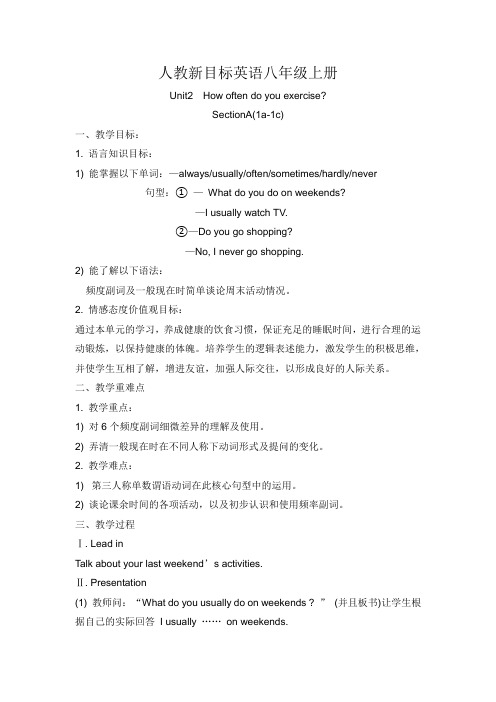
人教新目标英语八年级上册Unit2 How often do you exercise?SectionA(1a-1c)一、教学目标:1. 语言知识目标:1) 能掌握以下单词:—always/usually/often/sometimes/hardly/never句型:①—What do you do on weekends?—I usually watch TV.②—Do you go shopping?—No, I never go shopping.2) 能了解以下语法:频度副词及一般现在时简单谈论周末活动情况。
2. 情感态度价值观目标:通过本单元的学习,养成健康的饮食习惯,保证充足的睡眠时间,进行合理的运动锻炼,以保持健康的体魄。
培养学生的逻辑表述能力,激发学生的积极思维,并使学生互相了解,增进友谊,加强人际交往,以形成良好的人际关系。
二、教学重难点1. 教学重点:1) 对6个频度副词细微差异的理解及使用。
2) 弄清一般现在时在不同人称下动词形式及提问的变化。
2. 教学难点:1) 第三人称单数谓语动词在此核心句型中的运用。
2) 谈论课余时间的各项活动,以及初步认识和使用频率副词。
三、教学过程Ⅰ. Lead inTalk about your last weekend’s activities.Ⅱ. Presentation(1) 教师问:“What do you usually do on weekends ? ”(并且板书)让学生根据自己的实际回答I usually ……on weekends.(2) 教师出示动词卡片watch TV,read books,exercise,swimplay football、go shopping、go to movies让学生回答。
使用句型I often play soccer.What do you do on weekends?(3)点击鼠标屏幕上出现图片并出现频率副词,让学生快速认读。
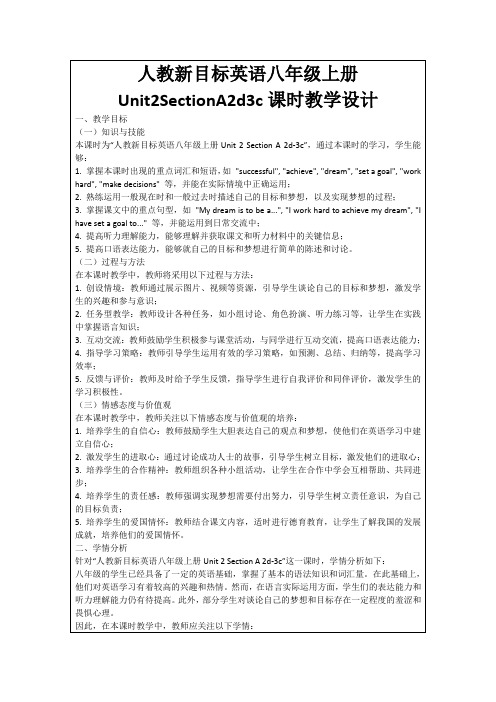
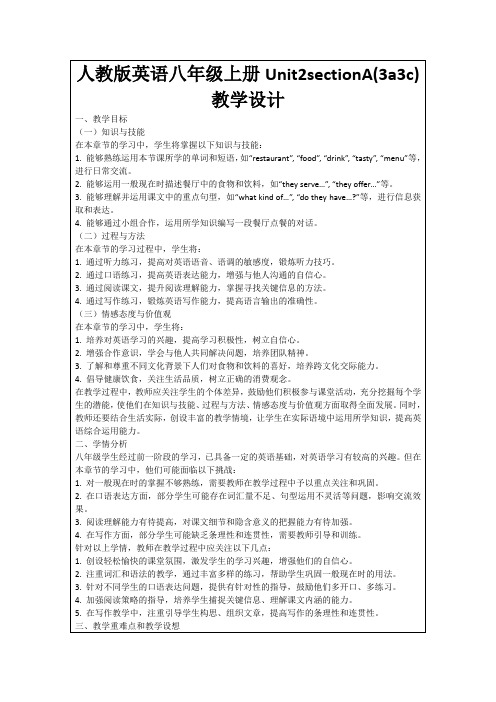
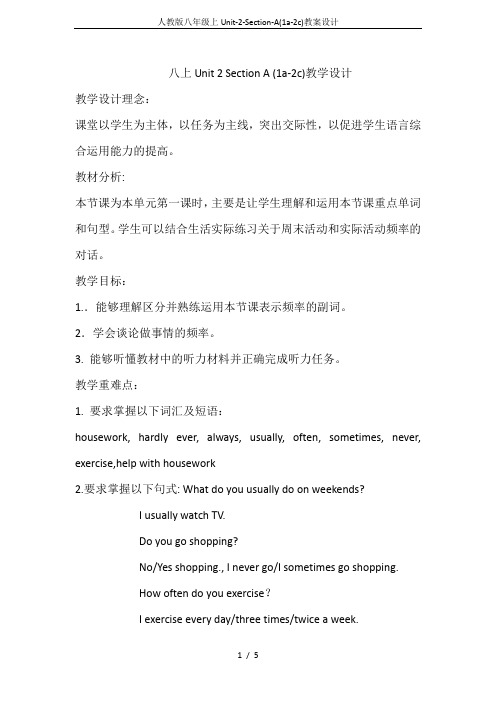
八上Unit 2 Section A (1a-2c)教学设计教学设计理念:课堂以学生为主体,以任务为主线,突出交际性,以促进学生语言综合运用能力的提高。
教材分析:本节课为本单元第一课时,主要是让学生理解和运用本节课重点单词和句型。
学生可以结合生活实际练习关于周末活动和实际活动频率的对话。
教学目标:1..能够理解区分并熟练运用本节课表示频率的副词。
2.学会谈论做事情的频率。
3. 能够听懂教材中的听力材料并正确完成听力任务。
教学重难点:1. 要求掌握以下词汇及短语:housework, hardly ever, always, usually, often, sometimes, never, exercise,help with housework2.要求掌握以下句式: What do you usually do on weekends?I usually watch TV.Do you go shopping?No/Yes shopping., I never go/I sometimes go shopping.How often do you exercise?I exercise every day/three times/twice a week.教学方法:asking and answering, listening ,speaking.教学工具: blackboard, textbook, PowerPoint, multimedia.教学过程:一.Discuss and report:Show some pictures,ask students questionsWhat do you usually do on weekends?引出频率副词never,hardly ever, sometimes, often, usually, always.频率副词在句中的位置是:实义动词之前,be动词或助动词之后。
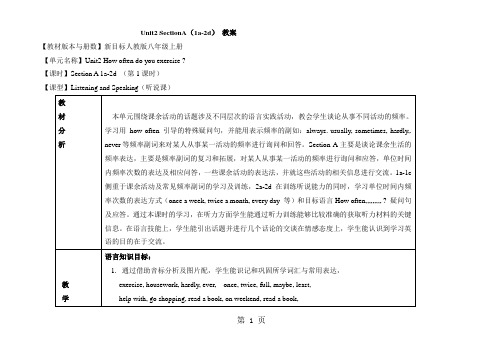
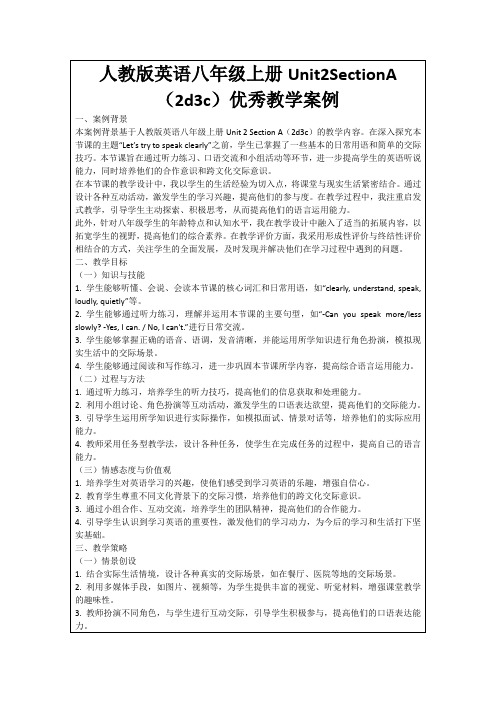
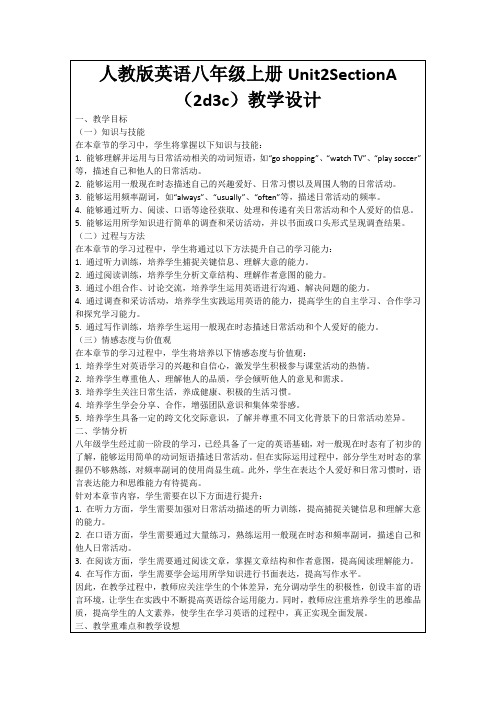
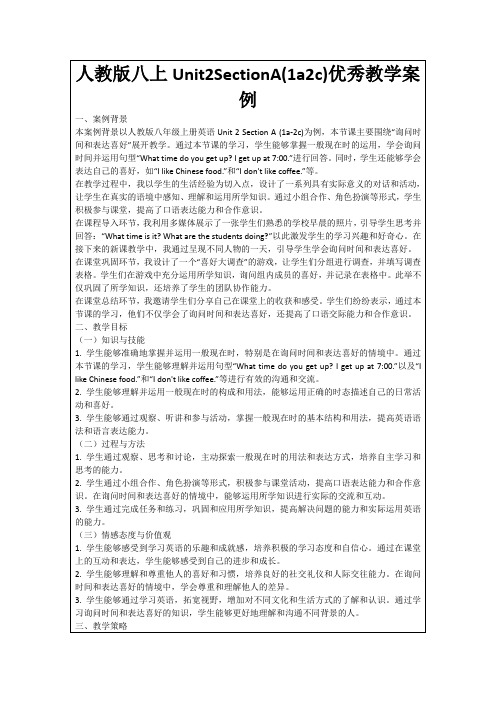
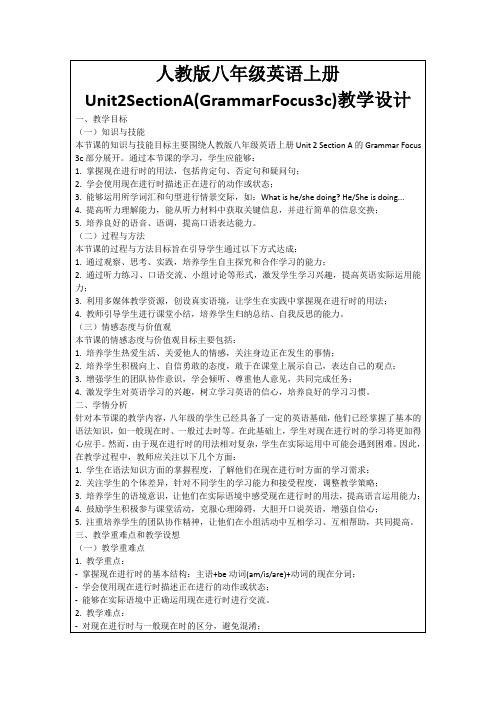
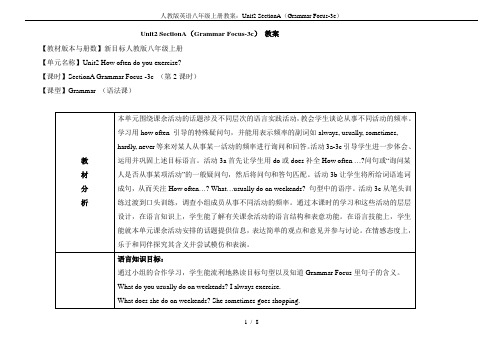
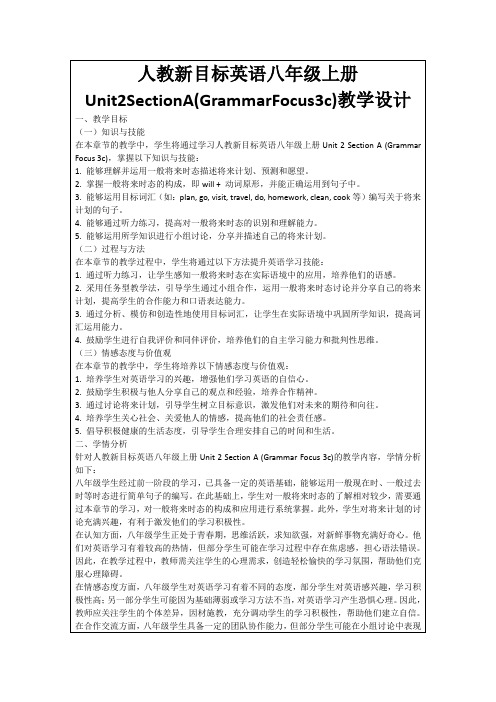
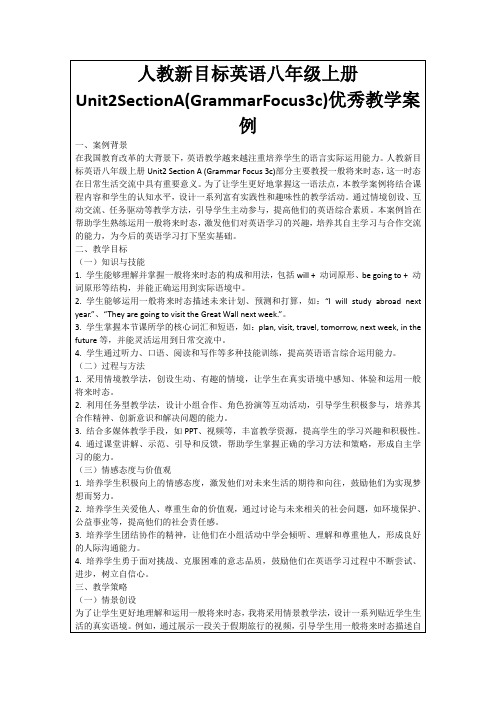
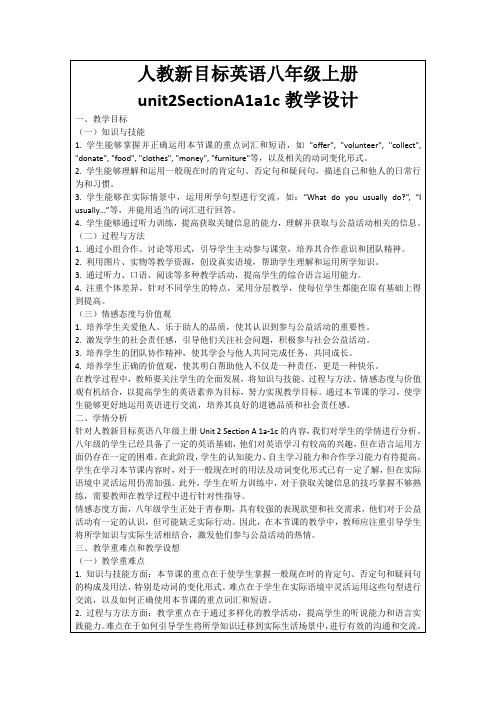
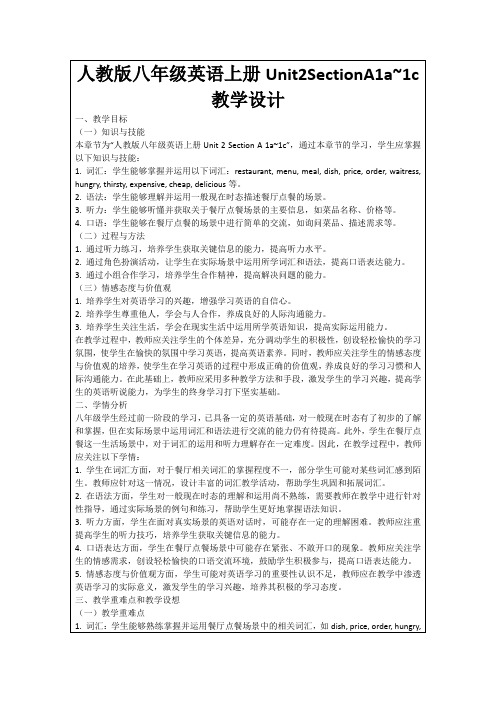

年级八年级科目英语任课教师贺兆凤授课时间2016 9.19课题Unit 2How often do you exercise?Section A 2a-2d授课类型听说课标依据1.能听懂有关熟悉话题的谈话并能从中提取信息和观点。
2.能针对所听语段的内容记录简单信息。
3.能根据话题进行情景对话。
一、教材分析本单元围绕课余活动的话题设计不同层次的语言实践活动,课本呈现了;频度副词的复习及拓展;对某人从事某一活动的频率进行询问和应答;单位时间内频率次数的表达法及相关问答;一些课余活动的表达法,并就这些相关的信息进行交流。
学生通过听说读活动,通过设计活动能够谈论从事不同活动的频率。
2a-2d是在训练听说能力的同时,学习时间内频率次数的表达方式和how often…?疑问句及回答。
2a-2d是在1a-1c的基础上继续练习听说,进行语言输入,感知体验目标语言。
二、学情分析通过上节课的学习,学生对于句中运用频度副词的位置有所掌握,但是第三人称单数谓语动词在此核心句型中的运用错误较多,比较混乱,第一人称也在用,复数也在用。
三、教学目标知识与技能1、会朗读、听懂并能表达本课词汇。
Once, twice, internet, program ,full, swing, swing dance2、能听懂在某一时间内干某事的次数表达,并会用英语正确表达频率副词。
正确朗读频率副词,能听懂并了解它们之间的区别.3、学会用how often 提问并且做出回答。
How often do you...? I ......4、运用频率副词谈论自己及他人的日常生活。
过程与方法以旧引新,为本页的学习作好铺垫。
教学过程:2a-2b为listening,2c 为fill in the blanks and make a conversations ,从听到说,2d为是在听说基础上更为综合的口头输出,方法:利用非听力因素来辅助理解,提高听力效率(1)充分利用听力文中图片,场景的观察和判断;培养学生的观察能力(2)利用听力材料所给的文字线索,训练和提高学生的听力水平。
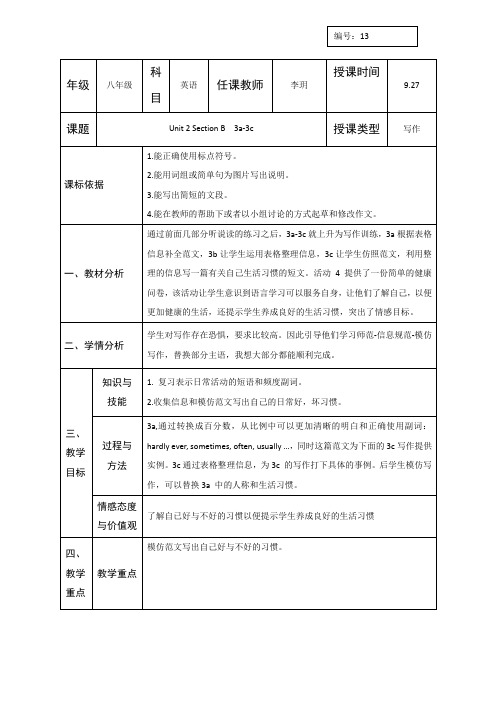
年级八年级科目英语任课教师李玥授课时间9.27课题Unit 2 Section B 3a-3c授课类型写作课标依据1.能正确使用标点符号。
2.能用词组或简单句为图片写出说明。
3.能写出简短的文段。
4.能在教师的帮助下或者以小组讨论的方式起草和修改作文。
一、教材分析通过前面几部分听说读的练习之后,3a-3c就上升为写作训练,3a根据表格信息补全范文,3b让学生运用表格整理信息,3c让学生仿照范文,利用整理的信息写一篇有关自己生活习惯的短文。
活动 4 提供了一份简单的健康问卷,该活动让学生意识到语言学习可以服务自身,让他们了解自己,以便更加健康的生活,还提示学生养成良好的生活习惯,突出了情感目标。
二、学情分析学生对写作存在恐惧,要求比较高。
因此引导他们学习师范-信息规范-模仿写作,替换部分主语,我想大部分都能顺利完成。
三、教学目标知识与技能1. 复习表示日常活动的短语和频度副词。
2.收集信息和模仿范文写出自己的日常好,坏习惯。
过程与方法3a,通过转换成百分数,从比例中可以更加清晰的明白和正确使用副词:hardly ever, sometimes, often, usually …,同时这篇范文为下面的3c写作提供实例。
3c通过表格整理信息,为3c 的写作打下具体的事例。
后学生模仿写作,可以替换3a 中的人称和生活习惯。
情感态度与价值观了解自已好与不好的习惯以便提示学生养成良好的生活习惯四、教学重点教学重点模仿范文写出自己好与不好的习惯。
编号:13难点掌握频度副词在表述级别上的细微差别。
教学难点五、教法学法任务型教学法六、师生活动设计意图教学过程设计Ⅰ. 3a.1. Look at the chart of 3a, the teacher ask all the studentsto help them fimiliar the chart.(1) what information can you find in the chart?(2)what’s the girl’s name?(3)what’s the meaning of : days a year”(4) what good habits does the girl have?(4) does the girl have any bad habits ? what are they?2. T:In order to help them know clearly the little differencesof the frequency words. We change the days into percent.Give them a model .3. Students do it alone. Then check the answer.4. The students learn the form of 3a, especially “ however”and the topic sentences.5. Read the text again.Try to recite the text, give them some link words.Ⅱ. 3b.You can choose from 3a the activities or page 132a, orpage 9, 1a if you don’t know what to write about. We canknow whether it’s healthy according to the frequency like“help with housework is a good habit. If we do it once a year,that’s a bad habit.( c.d)Brain storm: add more activities on 3a, then finish 3b.Ⅲ. 3cIn order to help some students, we can show some form ,give the the first and link words, so they can fill in to finishthe text.4. homework.熟读3a.完成3c习作引导学生看懂表格。
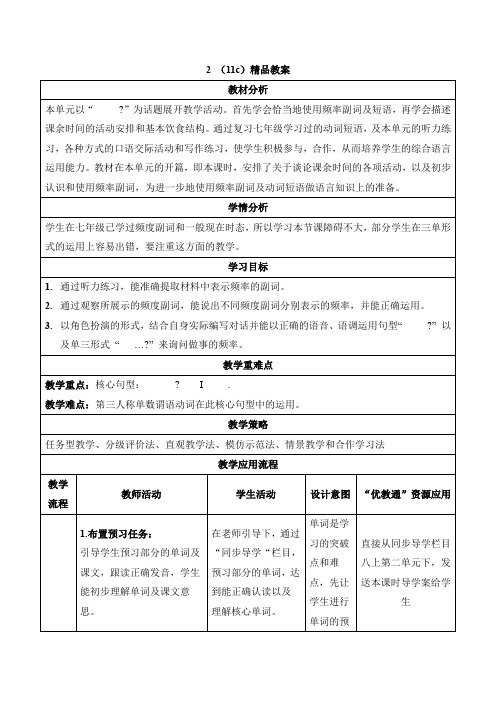
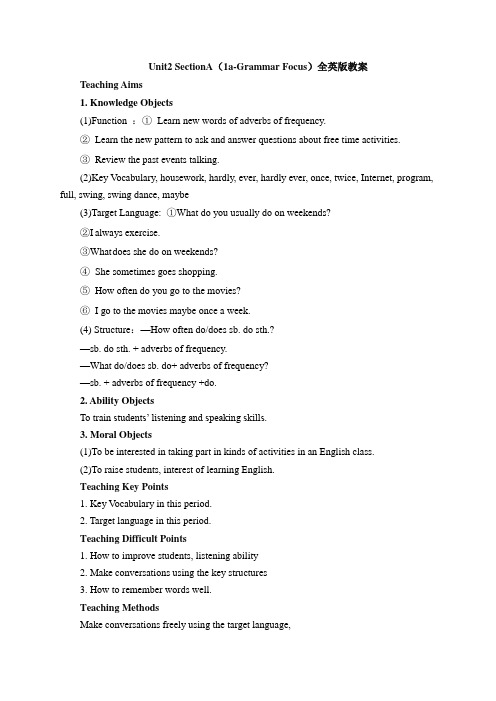
Unit2 SectionA(1a-Grammar Focus)全英版教案Teaching Aims1. Knowledge Objects(1)Function :①Learn new words of adverbs of frequency.②Learn the new pattern to ask and answer questions about free time activities.③Review the past events talking.(2)Key V ocabulary, housework, hardly, ever, hardly ever, once, twice, Internet, program, full, swing, swing dance, maybe(3)Target Language: ①What do you usually do on weekends?②I always exercise.③What d oes she do on weekends?④She sometimes goes shopping.⑤How often do you go to the movies?⑥I go to the movies maybe once a week.(4) Structure:—How often do/does sb. do sth.?—sb. do sth. + adverbs of frequency.—What do/does sb. do+ adverbs of frequency?—sb. + adverbs of frequency +do.2. Ability ObjectsTo train students’ listening and speaking skills.3. Moral Objects(1)To be interested in taking part in kinds of activities in an English class.(2)To raise students, interest of learning English.Teaching Key Points1. Key V ocabulary in this period.2. Target language in this period.Teaching Difficult Points1. How to improve students, listening ability2. Make conversations using the key structures3. How to remember words well.Teaching MethodsMake conversations freely using the target language,Teaching Aids1. A tape recorder.2. A computer for multimedia use.Teaching ProceduresStep 1 Leading in (about 3 minutes)Review the pattern learned last class.Let some students to make sentences using past tense.Start the class.T:Today we will learn some new patt erns using j adverbs of frequency. Let’s get started.Write the patterns on the blackboard.Step 2 Presentation (about 5 minutes)Have students look at the picture.Then ask a pair of students to read the dialogue in the picture.T:Please turn to page 9 and look at the picture of la.Then, I want some of you to read the dialogue.Who wants to be the volunteer?S1:What do you usually do on weekends?S2:I often go to the movies.T:Good! Thank you. Can anyone make 8 dialogue like this?S:What do you usually do on weekends? I always stay at home.T:Pretty good!Object:Get students familiar with the patterns and try to make sentences using the new patterns.Attention:If students have trouble in making sentences. Teacher can give students some minutes to discuss with their classmates. After making a sentence, teacher can give some suggestions or give an example before their own sentences.Step 3 la (about 5 minutes)Read the instructions.Ask students to make a list of the weekend activities.T:After making sentenc es, let’s finish the activity la together. Please look at the picture of la and think. Make a list of the weekend activities. If you have problems in making this list, you may refer to the pictures in la. Maybe you have the similar activities with the people in。
年级八年级科目英语任课教师李翠屏授课时间2016 .9.20
课题Unit 2 How often do you exercise?
Section A Grammar Focus-3c
授课类型语法课
课标依据
话题-结构-功能-任务的模式来安排教学内容,语法学习的目的是为了语言运用。
语法教学需要做到:
1. 在具体语境中理解语法项目;
2.了解常用语言形式的基本结构和常用表意功能。
3. 在实际运用中体会和领悟语言形式的表意功能。
4. 重视学生对语法学习过程的参与。
一、教材分析
本部分在Section A所输入语言知识的基础上,利用表格的形式梳理出本单元的语法学习要点。
3a-3c引导学生进一步体会、运用并巩固上述目标语言。
活动3a首先让学生用do或does补全How often…?问句或“询问某人是否从事某项活动”的一般问句,然后将问句和对应的答语匹配。
学生需要判断问句的类型,并抓住问句和答语中的人称主语及活动内容等关键信息。
这是一个关注语言结构的练习。
活动3b让学生将所给词语连成问句从而关注How often…?What …usually do on week?句型中的语序及其回答。
活动3c从笔头训练过渡到口头训练,让学生综合运用所学语言,调查小组成员从事不同活动的频率。
二、学情分析
本单元的核心话题是用一般现在时谈论做某事的频率。
频率副词的学习应是教学的重点。
本节语法课,学生通过朗读语法部分的句子,自主探究询问周末活动、询问频率的句子、并总结出主语为单三和非单三助动词的不同用法。
学生在前两课时询问频率已掌握较好,因此本节课应引导学生自主探究学习,找出规律。
并通过练习反馈学生对语法知识的学习。
编号:13
三、教
学
目
标
知识
与
技能
1.常见频度副词:always,usually,often,sometimes,hardly ever,never
及其用法;
2. 单位时间内活动频度次数的表达法:once a month, twice a week,
every day…;
3. 询问课余活动的问句What do you usually do on weekends?;
4.询问活动频率的问句How often…? 及其答语;
5.询问某人是否从事某项活动的问句及其答语
6.复习一般现在时表行
为习惯的用法;
过程
与
方法
通过朗读、观察、探究、总结、笔头,口语交际练习等活动,正确熟练使用目标语言项目,语境中理解语法项目,同时发展学生动脑思维能力。
在
实际运用中体会和领悟语言形式的表意功能。
采取任务性教学,通过任务驱
动促成语言教学有效达成。
情感态度
与价
值观
通过小组活动,学会谈论、分享课余活动并能合理安排课余活动;分享能促进英语学习的有效方法;促进合作交流,主动探究意识,感受成功的喜
悦、树立自信心。
四、
教学重点难点教学
重点
1.always,usually,often,sometimes,hardly ever,never常见频度副词及
其用法;
2. once a month, twice a week, every day…频度次数的表达法;
3. 句型What do you usually do on weekends? How often…? 及其答语;
4.复习一般现在时表行为习惯的用法。
教学难点运用频率副词谈论自己及他人的日常生活;
一般现在时疑问句中人称主语与助动词的搭配,第三人称单数动词的变化。
五、教法学法情景交际法、小组合作交流
六、教学过程设计师生活动设计意图
Ⅰ. Warming- up and revision
Make a conversation with sts.
I usually play basketball, what do you do on weekends? Then present
into new lesson.
Ⅱ. Grammar Focus.
Have sts read the sentences in Grammar Focus and have a
first discussion.
(1)询问课余活动的问句:
(2)询问活动频率的问句:
(3)询问某人是否从事某活动的一般疑问句:
(4)常见频度副词:
2.The second discussion
how often 意为“__________”,是用于提问表示________的特殊
疑问词组。
其答语应为表示________ 的副词或副词词组。
句子的时
态一般是_____________,也可以是一般过去时。
once , twice, three times等次数的表达法。
1) 这三个词都表示____,once是____,twice是____,除了一
次,两次,其他的次数都表达___________。
如:三次是__________,五次是_________。
在一般现在时的一般疑问句中,当主语为第三人称单数时,需要
句子前加助动词Do或Does 。
激发兴趣、引
发思考、激活背景
知识、导入新课。
观察讨论,自
主小结、操练运
用。
他们通常在周未锻炼吗?___ they often ________ on weekends?
她一周上网二次吗?_____ she _____ the Internet twice a week? Practice in pairs.
A: What does …do on weekends?
B: He / She …..
A: How often does he / she …?
B: He / She .....
4.Sts do some exercises.
1) 你通常在周未做什么?____ ____ you _______ do on weekends?
2) 我总是去运动。
I _______ _______.
3) 他们总是在周未做什么事情?___ ___ they ___ on weekends?
4) 他们经常帮助做家务.They ___ ___ with housework on weekends?
6) 她有时候去购物。
She ______ _______ _______.______?
7) 我可能一个月去看一次。
I go to movies _____ _____ a ______.
8) 他多久看一次电视? ______ _______ does he watch TV
9) 他几乎不看电视。
He ________ _______ watches TV.
10) 他去购物吗? ______ ______ go shopping?
11) 不,他从不去购物。
No, he _______ ______ shopping.
3. 学生们完成填空试题后,可以打开课本检查答案,对错误的句子,单独进行强化记忆。
IV. Work on 3a and 3b.
1. Let Ss work in groups of six or eight.
2. Tell Ss discuss what activities they do to improve their English. Then write the activities in the chart.
3. Ask their group mates the questions and fill in the chart.
4. Try to make a report about their partners. 合作相互交流学习,学生修正答案再归纳总结,教师点拨,检测效果。